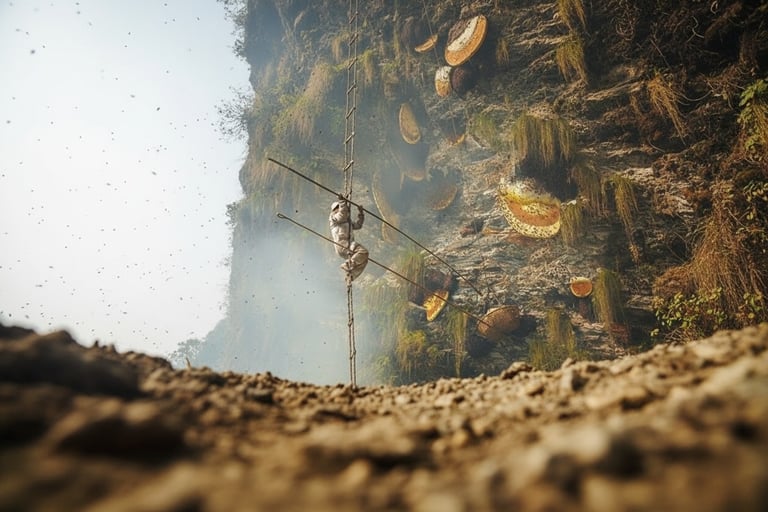The Mad Honey Diaries (Pt.3)
The Harvest and the First Taste
Jessie Cavendale
11/5/20253 min read


From our vantage point, the hunters were now specks against the vast, grey rock, silhouetted by the plumes of smoke they used to pacify the colonies. The giant Himalayan bees, Apis laboriosa, are the size of a man’s thumb, and their collective buzz was a deep, resonant thrum that vibrated in my chest, a sound of pure, primal power.
Dorje, seated cross-legged beside me, never took his eyes off them. His stillness was a lesson in focused energy. He pointed a gnarled finger upwards. "See," he grunted. "The dance begins."
Kamal, anchored precariously by a single rope, was now suspended alongside a massive, dark honeycomb that dripped like a stalactite from the rock overhang. Using his tangi, he began to make precise, careful cuts. The skill was breathtaking. Too forceful a cut, and the entire comb, a treasure built over seasons, could fall into the void. Too timid, and the harvest would be insufficient.
Large, glistening chunks of comb, heavy with the distinctive red-gold honey, were carefully lowered in a basket to Rohan on a ledge below. The air, already thick with mist, became saturated with a new scent: a floral, slightly spicy, intoxicating aroma. This was the smell of the rhododendron forests, concentrated into a sacred nectar. It was the smell of madness and magic.
The descent was, if possible, more nerve-wracking than the ascent. The hunters moved slowly, their baskets laden with precious cargo, the rope ladders swaying under the new weight. When Kamal’s feet finally touched the solid ground of our base camp, there was no triumphant shout, only a quiet, weary exhalation. He looked older, the strain of the climb etched deep around his eyes. But in those eyes, there was a bright, fierce light of success.
He knelt and opened the basket. Inside lay the spoils: chunks of honeycomb, dark and dripping, crawling with a few stray, disoriented bees. The mad honey. The Red Gold. It was more beautiful than any story could convey.
Kamal used his tangi to slice a small piece of comb, glistening with honey. He handed it to me. His soot-smudged face was unreadable. "You have walked with the hunters," he said, his voice rough. "You have respected the mountain and the song. Now, you taste its voice. Not like a tourist, taking a photo. You taste it like a hunter. Slowly."
My heart hammered against my ribs. This was the moment I had traveled across the world for. I placed the honey on my tongue.
The first sensation was pure, explosive flavor—floral, complex, with a slight bitterness that cut through the sweetness. It was unlike any honey I’d ever tasted. Then, I swallowed.
For a few minutes, nothing. Then, a warmth began to spread from my stomach, a gentle, radiating heat that flowed into my limbs. My fingers and toes began to tingle pleasantly, a light, effervescent sensation. The sharp edges of the world—the roar of the waterfall, the anxiety in my chest—seemed to soften and blur. A deep, euphoric calm settled over me. The fear was gone, replaced by a profound connection to the men around me, to the towering cliff, to the very air I was breathing. It wasn't a hallucination; it was an amplification. The mountain's voice, as the old anthropologist had said, was a low, resonant hum of belonging.
I looked at Kamal, and for the first time, he gave me a true, genuine smile. He nodded, understanding exactly what I was feeling.
The effect lasted for an hour, a gentle, warm wave that slowly receded, leaving behind a profound sense of peace and a clarity I hadn't known I was missing.
We packed the honey carefully into the baskets for the long journey back to Jogipada. As we prepared to leave, Kamal placed a hand on my shoulder. "You did not run from the cliff. You did not shout. You listened, and you tasted with respect." He paused. "Tomorrow, the village will celebrate. You will be our guest."
The quest for the honey was over. But the real journey, I sensed, was just beginning.
